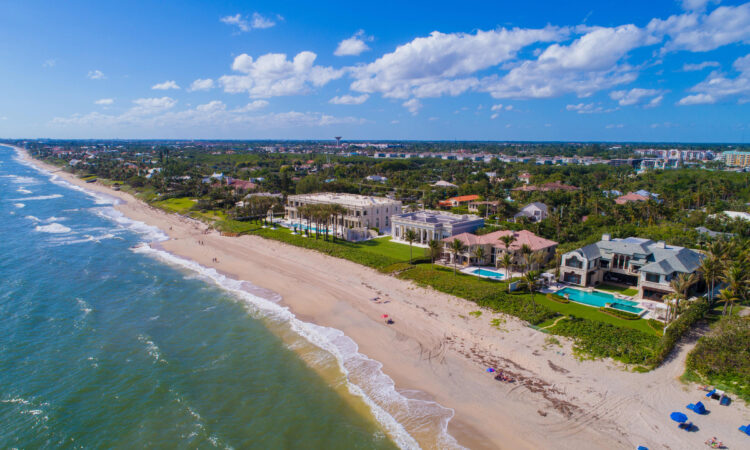
Buying a home often feels like nothing more than weathering an onslaught of fees and taxes. Lender fees, property taxes, down payments and closing costs are among some of the financial hurdles you have to clear to become a proud homeowner. But depending on where the home is located and how much it sold for, buyers may also be on the hook for yet another fee: a mansion tax.
A mansion tax is a type of real estate transfer tax that’s triggered when properties are sold above a certain amount. As the name suggests, the mansion tax applies primarily to expensive properties, though, the exact amount varies by state and sometimes city. In New York City, for example, properties that sell for above $1 million would have a mansion tax — even if it’s a studio apartment (mansion taxes can apply to any residential property, including co-ops and condos). The homebuyer typically pays the mansion tax as a percentage of the home’s sale price.
Subscribe to the CNBC Select Newsletter!
Money matters — so make the most of it. Get expert tips, strategies, news and everything else you need to maximize your money, right to your inbox. Sign up here.
At the time of writing, only seven U.S. states levy a mansion tax.
- Connecticut: 2.25% on properties exceeding $2.5 million
- District of Columbia: 1.45% on properties sold for $400,000 or more
- Hawaii: Marginal rates between 10% and 20% for estates valued at over $5.49 million
- New Jersey: 1% on real estate purchases over $1 million
- New York: 1% to 3.9% on residential purchases of $1 million or more
- Vermont: 16% on properties valued over $5 million
- Washington: Graduated rates at 1.28% for properties sold at a minimum of $500,000
While California doesn’t currently impose a mansion tax, Los Angeles County does. The tax, which went into effect in April 2023, weighs in at 4% for all Los Angeles properties sold or transferred above $5 million or more, and 5.5% for properties sold or transferred for above $10 million.
As you can see, a mansion tax can add significantly to the upfront costs of buying a home. To save some money during the home-buying process, you might consider applying for a mortgage from a lender that doesn’t charge some of the typical fees. Ally Bank, for instance, doesn’t charge any lender fees, so borrowers are off the hook for any application, origination, processing or underwriting fees.
Ally Home
-
Annual Percentage Rate (APR)
Apply online for personalized rates; fixed-rate and adjustable-rate mortgages included
-
Types of loans
Conventional loans, HomeReady loan and Jumbo loans
-
Terms
-
Credit needed
-
Minimum down payment
3% if moving forward with a HomeReady loan
If you’re a veteran (or a veteran’s family member), applying for a VA home loan can help you save thousands of dollars on your home purchase. That’s because VA loans don’t require a down payment and typically won’t charge private mortgage insurance (PMI).
PMI can cost anywhere from 0.5% to 1.5% of the loan amount and it’s usually charged if the borrower makes a down payment of less than 20% of the home’s value. But if buying a home using a VA loan, the PMI is usually waived. Some of CNBC Select’s top picks for VA loan lenders include Navy Federal Credit Union and PenFed Credit Union. PenFed also doesn’t charge lender fees and Navy Federal Credit Union lets sellers contribute up to 6% of the home’s value toward closing costs.
Navy Federal Credit Union
-
Annual Percentage Rate (APR)
Apply online for personalized rates
-
Types of loans
Conventional loans, VA loans, Military Choice loans, Homebuyers Choice loans, adjustable-rate mortgage
-
Terms
-
Credit needed
Not disclosed but lender is flexible
-
Minimum down payment
0%; 5% for conventional loan option
PenFed Credit Union Mortgage
-
Annual Percentage Rate (APR)
Apply online for personalized rates; fixed-rate and adjustable-rate mortgages included
-
Types of loans
Conventional loan, VA loan, FHA loan, Jumbo loan and adjustable-rate mortgage (ARM)
-
Terms
-
Credit needed
-
Minimum down payment
3.5% if moving forward with an FHA loan
Depending on the cost of your home and where you buy the home, you may have to pay a mansion tax. These taxes vary by state and (sometimes) city, so make sure you talk with your realtor or attorney about the potential cost. Mansion taxes can make an already expensive home even pricier. However, looking for ways to save on your mortgage can help those upfront costs feel a bit more affordable.
Catch up on CNBC Select’s in-depth coverage of credit cards, banking and money, and follow us on TikTok, Facebook, Instagram and Twitter to stay up to date.
Editorial Note: Opinions, analyses, reviews or recommendations expressed in this article are those of the Select editorial staff’s alone, and have not been reviewed, approved or otherwise endorsed by any third party.
